- Last Updated: February 16th, 2026
Key Takeaways
Expert witnesses are essential in social media harm cases to provide objective analysis, educate the court on technical matters, and establish causation between social media use and specific damages.
Evaluating the impact of social media algorithms and the adequacy of platform policies is crucial in determining the role of social media companies in amplifying potential harm to users.
Staying current with social media trends and effectively communicating complex technical concepts to juries are vital for expert witnesses to provide relevant and authoritative testimony in legal proceedings.
Overview of Social Media Harm Lawsuit Expert
On this page, we’ll discuss an overview of Social Media Harm Lawsuit experts, how expert testimony supports social media lawsuits, credentials and qualifications of social media harm experts, and much more.
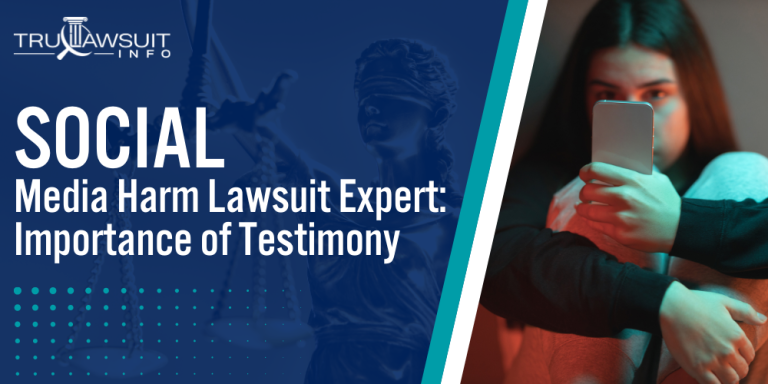
Intro to Social Media Harm Lawsuit Expert
Some of the key aspects of Social Media Harm Lawsuit Experts include, but are not limited to:
- Establishing Causation: Experts help establish the causal link between social media use and the alleged mental health harms suffered by plaintiffs.
- Providing Scientific Evidence: Social media harm experts present scientific research and studies to support the claims made in the lawsuits.
- Evaluating Platform Design: Experts analyze the design features of social media platforms that may contribute to addiction, mental health issues, and other harms.
- Assessing Damages: Experts assist in assessing the extent of damages suffered by plaintiffs due to the alleged harms caused by social media platforms.
If you believe that you or a loved one has suffered mental health issues due to the use of social media platforms, consulting with a social media harm lawsuit expert can help strengthen your case.
Contact TruLawsuit Info using the chat on this page for an instant case evaluation to find out if you qualify to join others filing social media harm lawsuits.
The Role of Expert Witnesses in Social Media Harm Cases
Expert witnesses play a pivotal role in legal social media disputes by providing detailed, objective insights and clarifying sophisticated technical matters for the court’s understanding.
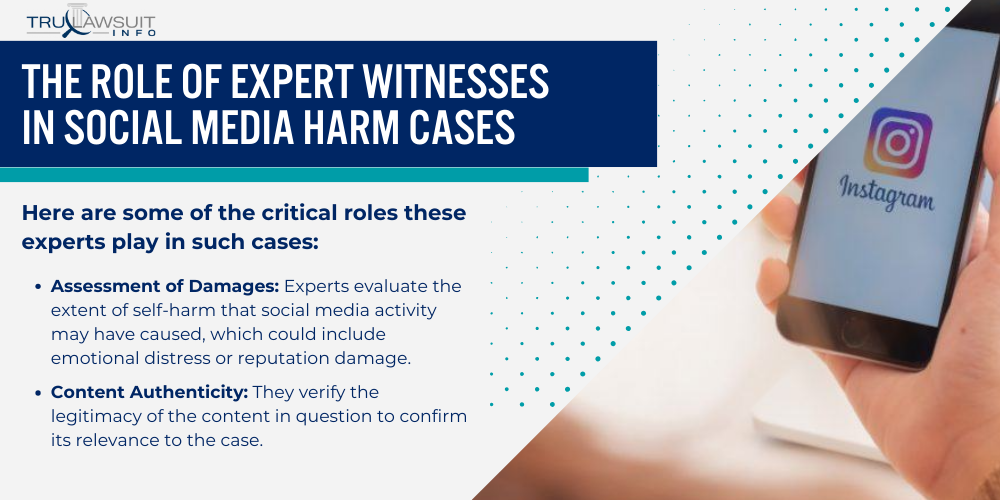
Providing Credible and Objective Analysis
Experts in social media harm cases are essential for offering an impartial examination of the evidence.
They analyze the digital trail and interpret social media activity to discern the potential impact on the parties involved.
Here are some of the critical roles these experts play in such cases:
- Assessment of Damages: Experts evaluate the extent of self-harm that social media activity may have caused, which could include emotional distress or reputation damage.
- Content Authenticity: They verify the legitimacy of the content in question to confirm its relevance to the case.
- User Behavior Analysis: Understanding the context of social media interactions helps in assessing the intention behind posts or messages.
- Comparative Analysis: They may provide insights by comparing the actions of the involved parties to a standard of conduct on social media platforms.
Educating the Court on Complex Technical Issues
The technical nature of major social media platforms often requires a detailed explanation to a legal audience that may not be as familiar with digital technologies.
To achieve this, experts typically focus on several key areas:
- Explaining Social Media Mechanics: Experts elucidate how certain features and algorithms of social media sites can affect user interaction and content distribution.
- Demonstrating Impact of Social Media on Behavior: They detail how social media can influence public opinion and personal behavior, which is vital in understanding the case’s context.
- Clarifying Data Collection Practices: Understanding how social media companies collect, store, and share data is critical in privacy violation cases.
- Presenting Digital Forensics: When necessary, they apply digital forensics techniques to unearth and analyze electronic evidence pertinent to the lawsuit.
Establishing Causation in Social Media Harm Lawsuits
Proving a social media company’s direct impact on users is vital when pursuing litigation related to social media harm.
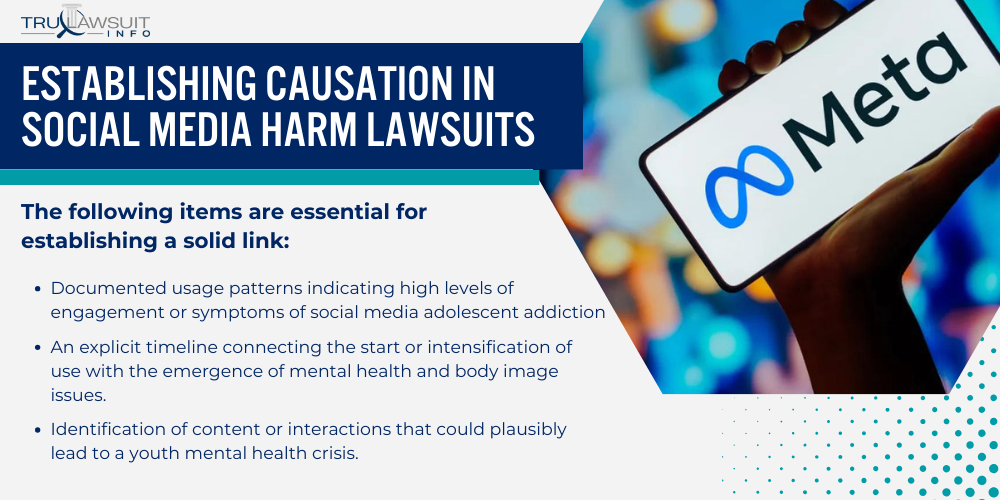
This section dissects the process of attributing specific damages to social media use and the importance of excluding other potential causes.
Linking Social Media Use to Specific Damages
Evidence must be carefully presented to demonstrate a direct correlation between social media use and resultant harm.
The following items are essential for establishing a solid link:
- Documented usage patterns indicating high levels of engagement or symptoms of social media adolescent addiction.
- An explicit timeline connecting the start or intensification of use with the emergence of mental health and body image issues.
- Identification of content or interactions that could plausibly lead to a youth mental health crisis.
- Expert testimony substantiating the connection between the platform’s design and harmful outcomes.
Each item is a foundational point for asserting that Meta and other social media companies were a determinative factor in the alleged harms.
Refuting Alternative Explanations for Harm
Counsel must effectively contest other potential reasons for the claimant’s distress to fortify the causative role of social media.
Critical approaches for refuting alternate causes include:
- They offer mental health evaluations and contest that conditions existed before social media influence.
- Cross-examining witnesses to highlight inconsistencies in alternative explanations.
- Presenting statistical data contrasting the prevalence of mental health disorders before and after the adoption of social media use.
- Analyzing lifestyle and environmental factors to isolate social media as the primary variable.
By systematically dismantling alternative explanations, the causal link between excessive social media use and the harm suffered by the plaintiff is reinforced.
Assessing the Impact of Social Media Algorithms
In the digital communication landscape, social media algorithms significantly influence user engagement and the dissemination of content.
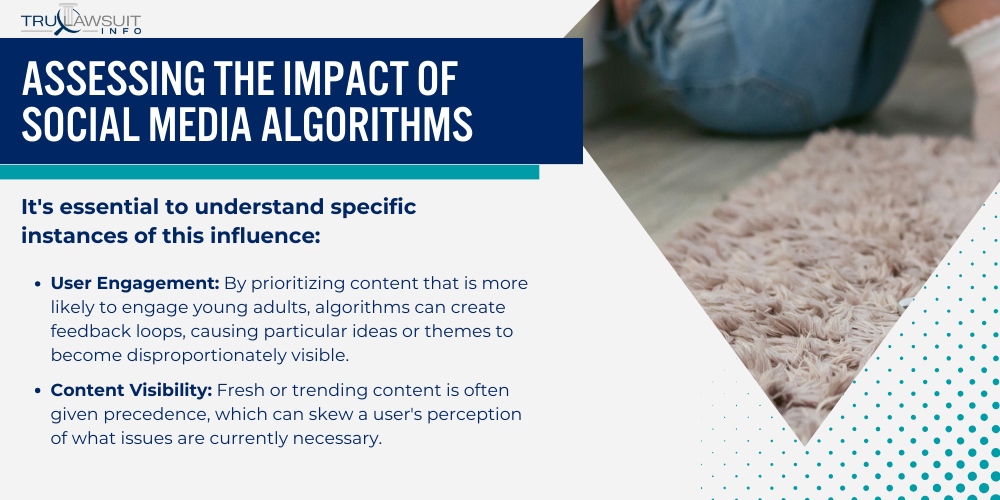
These automated systems often play a subtle yet powerful role in shaping online discourse and can have far-reaching effects.
Examining How Algorithms Influence User Behavior
Algorithms dictate much of what users see on social media platforms.
It’s essential to understand specific instances of this influence:
- User Engagement: By prioritizing content that is more likely to engage young adults, algorithms can create feedback loops, causing particular ideas or themes to become disproportionately visible.
- Content Visibility: Fresh or trending content is often given precedence, which can skew a user’s perception of what issues are currently necessary.
- Personalization: These systems tailor content to individual preferences, which may limit the diversity of content users are exposed to.
- Behavioral Reinforcement: Young social media users may be nudged to participate in specific ways based on the content that is consistently visible to them.
Determining the Role of Algorithms in Amplifying Harm
The proliferation of digital platforms has made algorithms an integral part of our daily interactions, but their impact is a double-edged sword.
While they can enhance user experience by personalizing content, they also have the potential to harm users by perpetuating harmful behaviors and content.
When analyzing social media algorithms, one cannot overlook their potential for amplifying harm, particularly regarding mental health problems:
- Echo Chambers: Algorithmically created echo chambers can contribute to the isolation of users and reinforce adverse mental health effects.
- Misinformation: The inadvertent promotion of misleading content can incite real-world consequences and aggravate users’ mental well-being.
- Social Comparison: Heightened exposure to the idealized lives of others can affect self-esteem and contribute to feelings of inadequacy.
- Addictive Behaviors: The design of certain algorithmic features may encourage compulsive usage patterns, with detrimental effects on other mental health issues.
Evaluating the Adequacy of Social Media Platform Policies
Regarding safeguarding users and ensuring responsible use, the policies enacted by social media platforms play a fundamental role.
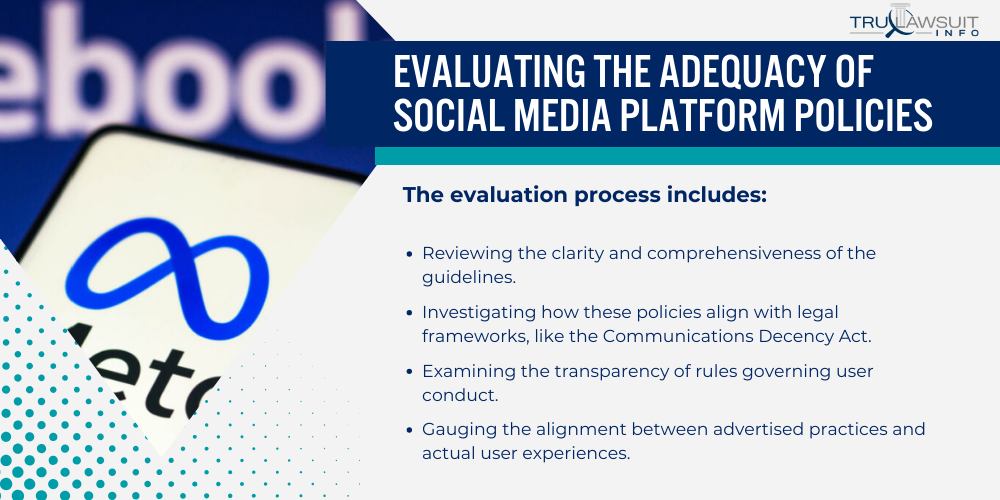
One must meticulously assess these policies and their real-world application to understand their effectiveness.
Analyzing Terms of Service and Community Guidelines
Terms of Service and community guidelines form the backbone of user engagement on social media platforms.
The evaluation process includes:
- Reviewing the clarity and comprehensiveness of the guidelines.
- Investigating how these policies align with legal frameworks, like the Communications Decency Act.
- Examining the transparency of rules governing user conduct.
- Gauging the alignment between advertised practices and actual user experiences.
Identifying Gaps in Platform Moderation and Enforcement
For social media platforms, consistent policy enforcement is essential for maintaining user trust.
Identifying gaps often entails:
- Assessing the effectiveness of content moderation systems.
- Pinpointing discrepancies in enforcement across different types of content.
- Recognizing the resources allocated to enforce these guidelines.
- Analyzing the platforms’ responses to policy violations and their impact on young users.
By carefully examining these subsections, one can determine the adequacy of social media platforms’ policies and commitment to user safety and ethical practices.
Quantifying Damages in Social Media Harm Cases
Accurately quantifying damages is vital for plaintiffs and the court when seeking financial compensation for social media harm.
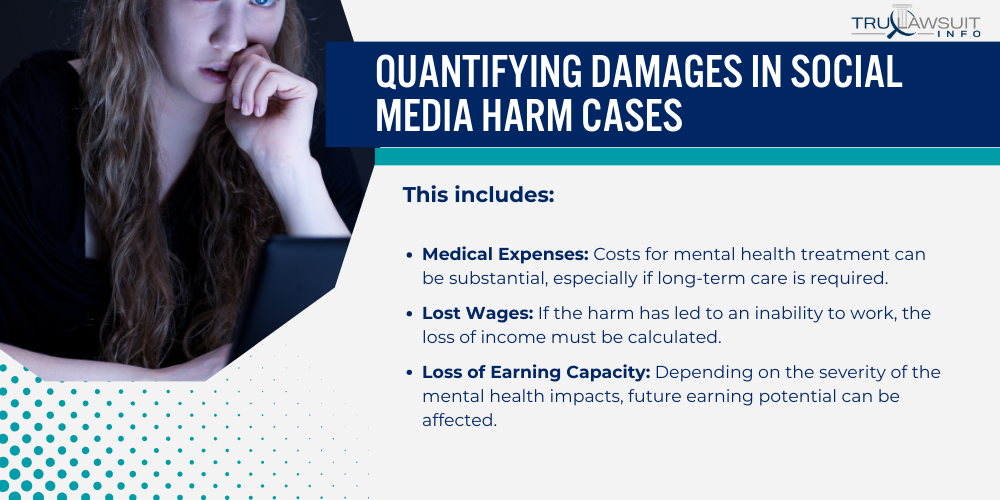
This process involves intricate calculations to ensure fair compensation that reflects the harm’s economic and non-economic impacts.
Calculating Economic Losses and Medical Expenses
Determining economic losses involves attributing financial impacts directly related to the harm.
This includes:
- Medical Expenses: Costs for mental health treatment can be substantial, especially if long-term care is required.
- Lost Wages: If the harm has led to an inability to work, the loss of income must be calculated.
- Loss of Earning Capacity: Depending on the severity of the mental health impacts, future earning potential can be affected.
- Other Expenses: Legal advice or therapy costs can add to the economic losses.
Assessing Non-Economic Damages, Such as Emotional Distress
Emotional distress represents a significant challenge in quantification but is an essential component of many social media harm lawsuits.
Non-economic damages can be evident through:
- Psychological Trauma: The severity of mental suffering and its duration are evaluated.
- Reputational Damage: Harm to personal or professional reputation can have long-lasting effects.
- Quality of Life: The general decrease in life satisfaction and daily functioning is considered.
- Pain and Suffering: The intangible distress experienced due to the incident must be acknowledged.
Quantifying damages in cases of social media harm requires a systematic approach that carefully considers both the visible and invisible effects of the harm.
These calculations serve as the backbone for pursuing justice and repairing the lives of those affected.
Evidentiary Challenges in Social Media Litigation
Evidence from social platforms can play a pivotal role in social media litigation.
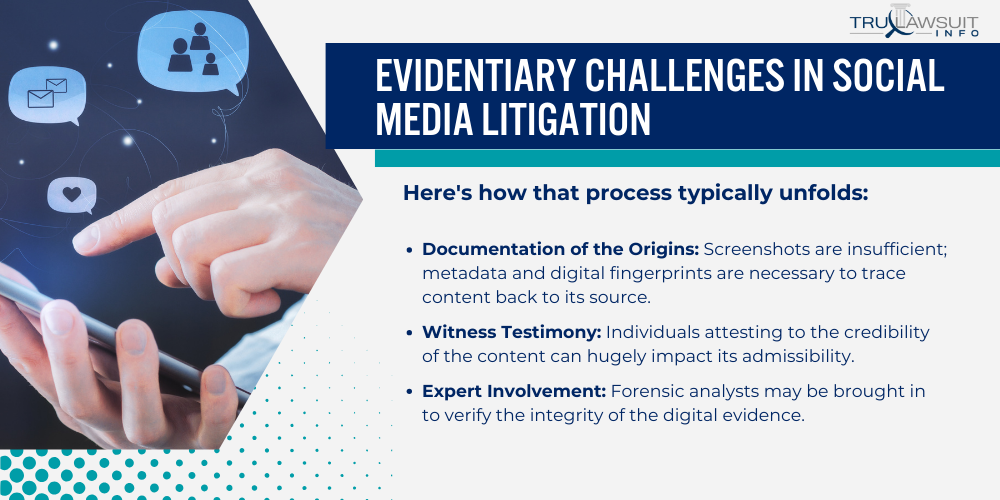
However, there are obstacles to ensuring such information is accepted in legal proceedings.
Authenticating Social Media Evidence
Social media content must be confirmed as genuine before being used in court.
Here’s how that process typically unfolds:
- Documentation of the Origins: Screenshots are insufficient; metadata and digital fingerprints are necessary to trace content back to its source.
- Witness Testimony: Individuals attesting to the credibility of the content can hugely impact its admissibility.
- Expert Involvement: Forensic analysts may be brought in to verify the integrity of the digital evidence.
- Application of Legal Standards: Courts rely on established criteria to assess the admissibility of social media evidence.
Addressing Issues of Privacy and Data Protection
In today’s digital age, privacy, and data protection are paramount concerns for individuals and entities alike.
As social media platforms collect vast amounts of personal data, ensuring this information is handled securely and ethically is crucial to maintaining user trust and complying with international data protection laws.
The handling of private information from social media platforms must adhere to strict legal frameworks to be permissible in court:
- Understanding Consent: Shared content might be protected by privacy settings or consent agreements, impacting its use in litigation.
- Compliance with Regulations: Legislation like the Communications Decency Act Section 230 may limit liability for harmful content users post.
- Seeking Legal Access: Litigators must navigate through proper legal channels to obtain protected social media data.
- Preserving Data Integrity: Continuous updates and deletions on social media can alter evidence; it’s essential to secure relevant data promptly.
The Importance of Staying Current with Social Media Trends
Staying current with social media trends is vital for experts involved in legal matters to provide relevant and compelling testimony.
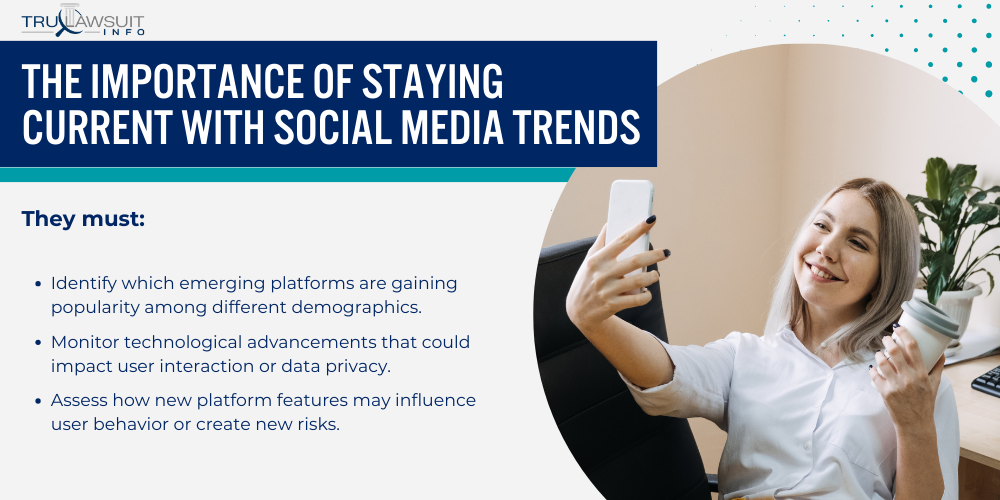
Understanding these trends enables professionals to analyze and present cases related to social media effectively.
Keeping Abreast of Emerging Platforms and Technologies
Staying informed about new social media platforms and technologies is essential for legal experts.
They must:
- Identify which emerging platforms are gaining popularity among different demographics.
- Monitor technological advancements that could impact user interaction or data privacy.
- Assess how new platform features may influence user behavior or create new risks.
- Understand the significance of these trends in the context of legal responsibilities and potential liabilities.
Adaptability is imperative as the social media landscape continuously evolves with the introduction of new channels like TikTok and Clubhouse.
Adapting Expert Testimony to Reflect Changing Landscapes
As technology advances and social media platforms evolve, the nature of expert testimony in legal contexts must adapt to reflect these changes accurately.
Experts are increasingly required to consider the dynamic characteristics of digital communication and its effects on society when formulating their analyses.
Expert testimony must evolve to remain authoritative:
- Evaluate the implications of recent updates on significant platforms such as Facebook, Instagram, and Twitter.
- Incorporate current user data and statistic trends that reflect the ever-changing nature of platforms like YouTube and LinkedIn.
- Explain how shifts in the social media environment might affect the legal interpretation of user conduct.
- Prepare to address questions on the influence of social media trends on public opinion, which could impact jury decisions.
Experts must continuously update their knowledge to ensure their testimony reflects the current state of social media usage and its legal implications.
Communicating Complex Technical Concepts to Juries
In trials involving social media harm, experts must convey intricate details in a manner that jurors can understand.
Clear and effective communication is essential to ensure that jurors grasp the technical concepts and evidence presented.
Translating Jargon into Plain Language
Experts serving in a social media addiction lawsuit must decode the technical language for the jury.
Here’s how they achieve this:
- Identify and replace jargon with everyday terms.
- Draw parallels between complex ideas and familiar scenarios.
- Break down intricate concepts into simple, digestible steps.
- Employ analogies to relate technical aspects to everyday experiences.
Experts need to ensure that their explanations are simple and accurate without oversimplifying to the point of inaccuracy.
Using Visual Aids to Enhance Understanding
Visual aids play a key role in helping the j to visualize technical evidence.
Below are ways experts utilize them:
- Create clear, concise charts or graphs to represent data patterns.
- Use flowcharts to demonstrate processes or cause-and-effect relationships.
- Develop interactive displays or simulations to depict how social media algorithms may function.
- Incorporate diagrams or illustrations to outline complex systems or networks.
These visual instruments support verbal explanations and aid jurors in constructing a concrete understanding of the testimony presented.
TruLawsuit Info: #1 Social Media Lawyers
TruLawsuit is a leading firm dedicated to supporting clients in social media-related legal challenges.
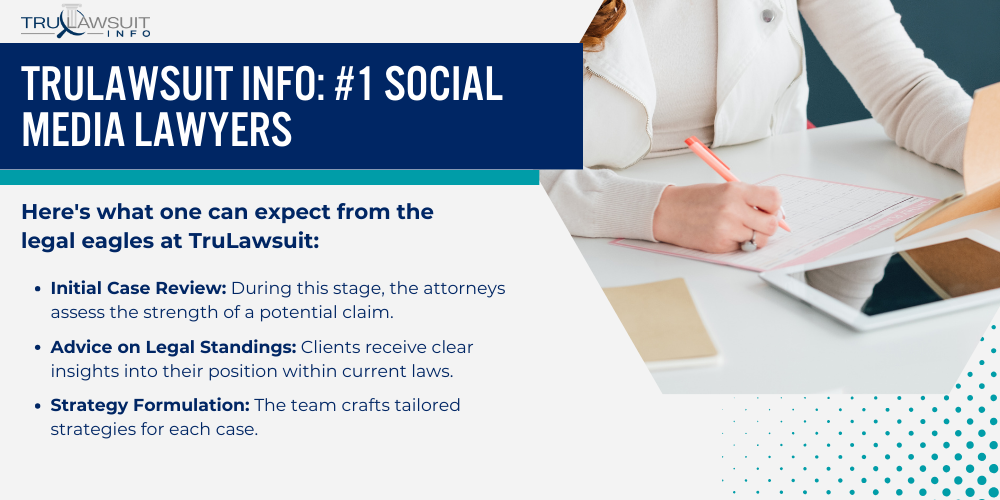
They provide services with a combination of expertise and a clear understanding of online legal disputes.
Free consultations are offered to help potential clients understand their legal options.
Here’s what one can expect from the legal eagles at TruLawsuit:
- Initial Case Review: During this stage, the attorneys assess the strength of a potential claim.
- Advice on Legal Standings: Clients receive clear insights into their position within current laws.
- Strategy Formulation: The team crafts tailored strategies for each case.
- Representation Excellence: They uphold client interests in courtrooms or settlements with tenacity.
The firm specializes in personal injury claims arising from social media disputes and excels at recovering damages for its clients.
They understand the impacts of defamatory online content and privacy breaches, offering solid legal support.
The process is streamlined into manageable steps:
- Documentation: Gathering of evidence and pertinent information.
- Legal clarity: Simplifying legal jargon for client comprehension.
- Negotiation: Handling discussions with the opposing parties.
- Litigation: If necessary, they are well-prepared to advocate in court.
TruLawsuit’s attorneys blend their legal knowledge with an empathetic approach to comfortably guide clients through legal proceedings.
Their diverse experience in social media law makes them a reliable choice for those seeking justice in an ever-evolving digital landscape.
Frequently Asked Questions
-
Social media companies face increasing liability for personal injuries when their platforms contribute to harm.
For example, a social media lawsuit highlighted the interaction between social media and the law, particularly when a user’s privacy is violated or otherwise harmed.
-
Legal strategies against social media platforms for addiction often involve proving negligence in the design and operation that facilitates addictive behavior.
Lawyers may draw on research linking platform algorithms to increased user engagement at the cost of mental health.
-
Precedents in this area often involve cases where social media use is linked to psychological distress or damage.
Courts have begun recognizing the potential harm social media can inflict, setting legal standards for social media companies’ responsibility for mental health outcomes.
-
Parents have been increasingly successful in challenging social media companies when they can demonstrate that the platform consciously exploits the vulnerability of youth.
These legal actions focus on how platforms designed features that may lead to addiction and eating disorders in minors.
-
Posting on social media during litigation can undermine a case, as posts may be used as evidence.
Lawyers typically advise clients to be mindful of their online activity, because anything shared publicly can impact the legal process.
-
The outcomes of the 2023 lawsuits have promoted greater transparency and shifts in policy among social media companies.
Heightened public and legal scrutiny pushes platforms to implement more robust moderating practices or precise guidelines to protect users.

Attorney Jessie Paluch, founder of TruLawsuit Info, has over 25 years of experience as a personal injury and mass tort attorney, and previously worked as an international tax attorney at Deloitte. Jessie collaborates with attorneys nationwide — enabling her to share reliable, up-to-date legal information with our readers.
Legally Reviewed
This article has been written and reviewed for legal accuracy and clarity by the team of writers and legal experts at TruLawsuit Info and is as accurate as possible. This content should not be taken as legal advice from an attorney. If you would like to learn more about our owner and experienced injury lawyer, Jessie Paluch, you can do so here.
Fact-Checked
TruLawsuit Info does everything possible to make sure the information in this article is up to date and accurate. If you need specific legal advice about your case, contact our team by using the chat on the bottom of this page. This article should not be taken as advice from an attorney.
You can learn more about the Social Media Harm Lawsuit by visiting any of our pages listed below:
Here, at Tru Lawsuit Info, we’re committed to helping victims get the justice they deserve.
To do this, we actively work to connect them with attorneys who are experts in litigating cases similar to theirs.
Table of Contents
Tru Lawsuit Info is a reliable source of information about issues that may affect your health and safety, such as faulty products, data breaches, and environmental hazards.
Our team of experienced writers collaborates with medical professionals, lawyers, and advocates to produce informative articles, guides, and other resources that raise awareness of these topics.
Our thorough research provides consumers with access to reliable information and updates on lawsuits happening around the country. We also can connect consumers with attorneys if they need assistance.
Here, at Tru Lawsuit Info, we’re committed to helping victims get the justice they deserve.
To do this, we actively work to connect them with attorneys who are experts in litigating cases similar to theirs.
